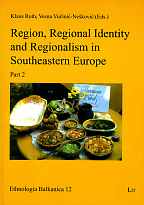Identity of the Nation(s), Identity of the State: Politics and Ethnicity in the Republic of Macedonia, 1990–2000
Identity of the Nation(s), Identity of the State: Politics and Ethnicity in the Republic of Macedonia, 1990–2000
Author(s): Nevena DimovaSubject(s): Anthropology
Published by: LIT Verlag
Keywords: identity; nation; Macedonia; 1990-2000; interethnic relations; stereotypes;
Summary/Abstract: In this paper I follow the political developments in the Republic of Macedonia, from its split from Yugoslavia in 1991 to the armed clashes between Albanian paramilitary organizations and the Macedonian police and army in 2001, and the period following the signing of the Ohrid Agreement of the same year. Simultaneously, I analyse the political debates and social commentaries put forward by Macedonian and Albanian political and intellectual elites about the current political events, the relations between the two communities, and about each other. I argue that multiparty democracy has fortified the relations of distance between Macedonians and Albanians inherited from state socialism by opening space for new voices and new means to be engaged in the debates about the constitution of the Macedonian state and nation(s). In the polemics about the state and the populations residing on the territory of Macedonia, intellectual and political elites from both sides utilize the global concepts of civil society, multiethnicity, and pluralism as discursive tools to put forward nationalist arguments and undermine those of their opponents. These concepts are incorporated in modernist discourse through which Macedonian and Albanian intellectual and political elites reinforce images of modern vs. primitive, progressive vs. backward, and legitimate vs. illegitimate to claim the right to organize the state and deny that right to the other. Thus, while as societal models multiculturalism and civil society are intended to “put a lid” on pre-existing ethnic tensions in Macedonia, in particular, but also throughout Eastern Europe and in post-colonial states, their strategic use as a discourse, as a narrative tool in local politics, in fact often times serves opposite purposes. Entering the context of pre-existing nationalist struggles, “global flows” can actually reify political, national, and ethnic units.
Journal: Ethnologia Balkanica
- Issue Year: 2008
- Issue No: 12
- Page Range: 183-213
- Page Count: 31
- Language: English
- Content File-PDF

